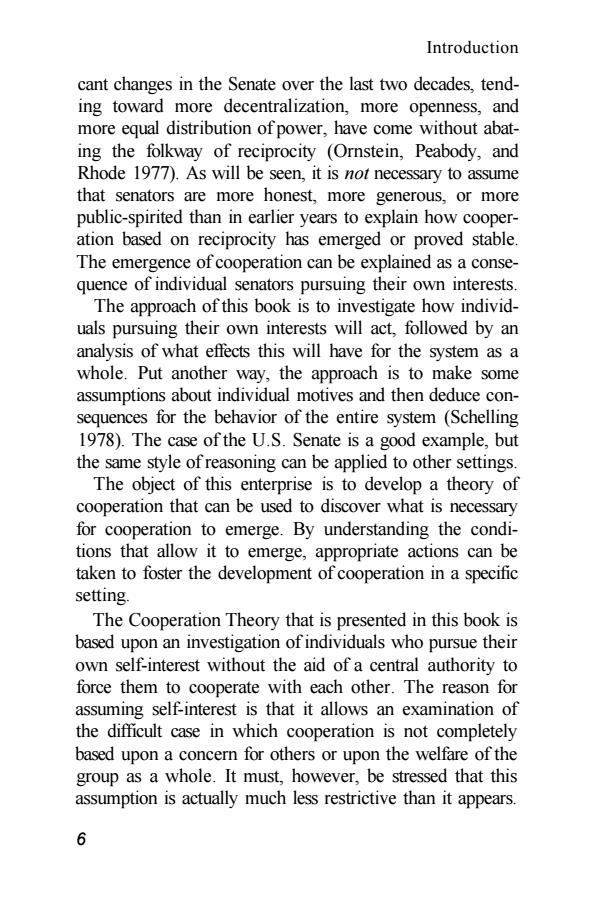正在加载图片...

Introduction cant changes in the Senate over the last two decades,tend- ing toward more decentralization,more openness,and more equal distribution of power,have come without abat- ing the folkway of reciprocity (Ornstein,Peabody,and Rhode 1977).As will be seen,it is not necessary to assume that senators are more honest,more generous,or more public-spirited than in earlier years to explain how cooper- ation based on reciprocity has emerged or proved stable. The emergence of cooperation can be explained as a conse- quence of individual senators pursuing their own interests. The approach of this book is to investigate how individ- uals pursuing their own interests will act,followed by an analysis of what effects this will have for the system as a whole.Put another way,the approach is to make some assumptions about individual motives and then deduce con- sequences for the behavior of the entire system (Schelling 1978).The case of the U.S.Senate is a good example,but the same style of reasoning can be applied to other settings. The object of this enterprise is to develop a theory of cooperation that can be used to discover what is necessary for cooperation to emerge.By understanding the condi- tions that allow it to emerge,appropriate actions can be taken to foster the development of cooperation in a specific setting. The Cooperation Theory that is presented in this book is based upon an investigation of individuals who pursue their own self-interest without the aid of a central authority to force them to cooperate with each other.The reason for assuming self-interest is that it allows an examination of the difficult case in which cooperation is not completely based upon a concern for others or upon the welfare of the group as a whole.It must,however,be stressed that this assumption is actually much less restrictive than it appears. 6Introduction cant changes in the Senate over the last two decades, tending toward more decentralization, more openness, and more equal distribution of power, have come without abating the folkway of reciprocity (Ornstein, Peabody, and Rhode 1977). As will be seen, it is not necessary to assume that senators are more honest, more generous, or more public-spirited than in earlier years to explain how cooperation based on reciprocity has emerged or proved stable. The emergence of cooperation can be explained as a consequence of individual senators pursuing their own interests. The approach of this book is to investigate how individuals pursuing their own interests will act, followed by an analysis of what effects this will have for the system as a whole. Put another way, the approach is to make some assumptions about individual motives and then deduce consequences for the behavior of the entire system (Schelling 1978). The case of the U.S. Senate is a good example, but the same style of reasoning can be applied to other settings. The object of this enterprise is to develop a theory of cooperation that can be used to discover what is necessary for cooperation to emerge. By understanding the conditions that allow it to emerge, appropriate actions can be taken to foster the development of cooperation in a specific setting. The Cooperation Theory that is presented in this book is based upon an investigation of individuals who pursue their own self-interest without the aid of a central authority to force them to cooperate with each other. The reason for assuming self-interest is that it allows an examination of the difficult case in which cooperation is not completely based upon a concern for others or upon the welfare of the group as a whole. It must, however, be stressed that this assumption is actually much less restrictive than it appears. 6